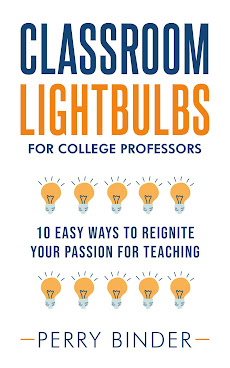
As I reflect on this past semester, I'm already preparing for 2011 classes. As I do so, I'm proud to say that a former student just applied to the Teach for America program. For the teachers and professors in this profession for the short term or the long haul, here's my take on staying fresh in the classroom:
There is a symmetry to every college semester, with a set number of weeks and exams at fixed intervals. Just like a Hollywood screenplay has three acts, I love the predictability that the semester structure brings. After teaching for a while, I became adept at seeing common class trends and defining plot points along an arc - when to expect enthusiastic student participation, when students might be stressed or losing confidence, when to pull back on the material or forge full speed ahead. While the structure is predictable, every semester has an energy and a life of its own.
Someone once asked me how I can teach the same subjects year after year without getting bored. My answer back: “Do you think that a recording artist gets bored singing the same song for the past thirty years?” It may be the same song, but there’s a different interpretation and a fluid audience each time. A performer can kill one night, and then fall flat the next evening if the crowd’s chemistry isn’t there. The song remains the same, but those sitting in on the sessions may not always be on the same page. Yes, the course material is similar from year to year, but meeting different students each time is the secret part of the equation which keeps things lively, unpredictable, and exciting.
A teacher’s job is to keep things fresh and provocative, regardless of mood, subject, or student engagement. The show must always go on. The good news is that there’s ample opportunity to shift gears from week to week to capture attention and to captivate. ...
Naturally, my curious students ask me why I don’t practice law anymore. The best answer I can come up with is an analogy from the movie, Good Will Hunting, when psychologist Robin Williams is discussing personal relationships with patient, Matt Damon. Damon just had a perfect first date with Minnie Driver, and he tells Williams that he’s never going to call her again. To which a surprised Williams inquires why. Damon explains that the date was so perfect, that he didn’t want to ruin that memory or image, and risk an imperfect second date. The psychologist smiles and reminds his young patient that he’s not so perfect himself, and neither is his recent date. The trick he says is to take a risk and discover whether you’re perfect for each other.
Being a teacher is not a perfect profession, and I know I’m an imperfect teacher. But we’re perfect for each other. I’ve learned, changed, grown, and gotten back more than I bargained for in many courtrooms and classrooms.
Today, I am refreshed and ready, but already messed up on the first day of the current term in front of 120 students. While I remembered to bring the syllabus, I forgot to bring their outline for the first unit. The class was already confused about the first assignment.
Maybe I have an overactive imagination or a hypersensitive ear, but I could’ve sworn I heard a student mutter under her breath: “This professor sucks!”
Excerpt from Unlocking Your Rubber Room: 44 Off-the-Wall Lessons
c 2009 Perry Binder








.jpg)